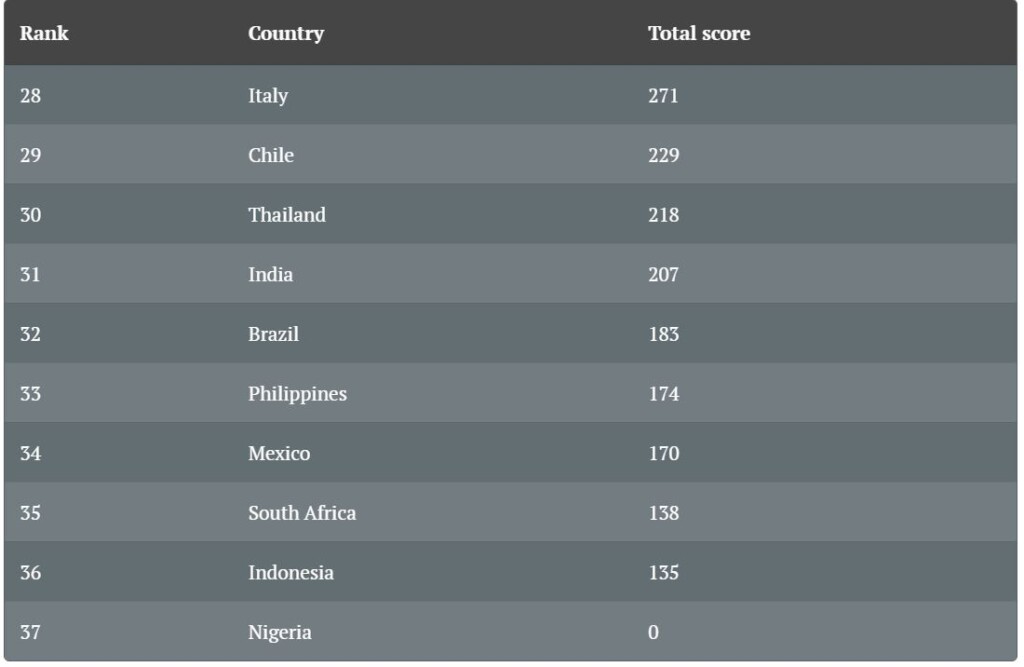South Africa’s Position in Global Digital Metrics
A recent study has revealed that South Africa is lagging behind in several key areas of digital readiness, ranking as one of the worst-performing nations among 37 countries analyzed. This poor performance is largely attributed to slow 5G connectivity, limited digital skills, and inadequate internet infrastructure, all of which threaten the nation’s ability to build a robust digital economy.
The research, conducted by wireless connectivity expert Airgain, evaluated countries based on factors such as internet speeds, mobile penetration rates, digital skills, 5G deployment, and affordability of internet services. Educational metrics were also considered to provide a comprehensive picture of each nation’s digital landscape.
Key Findings of the Study
South Africa’s ranking—35th out of 37 countries—paints a grim picture of its digital future. According to the study, only Indonesia and Nigeria, another African nation, performed worse. All three countries are part of the bottom 10, dominated by emerging markets, with Italy being the only developed country in this group, ranking 28th.
The study’s data was sourced from reputable organizations, including:
- UNESCO for tertiary education enrollment rates.
- Wiley’s Digital Skill Gap Index to assess digital strength and responsiveness.
- OECD statistics for mobile penetration metrics.
- Broadband Genie’s Affordability Index for measuring the cost of internet services.
Bottom 10 in 5G and digital economy (source: Airgain research)

Why South Africa Struggles with Digital Readiness
The findings indicate that South Africa’s challenges stem from poor digital skills and low internet speeds, despite efforts in recent years to promote technological advancement and digital innovation. These deficiencies limit the country’s ability to harness the full potential of the digital economy.
Airgain Chief Technology Officer Ali Sadri emphasized the importance of reliable internet access, stating, “Access to fast, reliable internet is a gamechanger for any population. It doesn’t just boost connectivity – it fuels the knowledge economy, which now accounts for roughly 50% of global economic activity. When people have the tools to access, share, and create knowledge quickly, innovation thrives.”
The Global Digital Leaders
In stark contrast to South Africa’s ranking, countries such as the United Arab Emirates (UAE), Finland, and South Korea are leading the charge in digital readiness. The UAE topped the list, boasting average mobile download speeds of 413 Mbps, followed by Qatar at 350 Mbps and Kuwait at 257 Mbps. These nations have heavily invested in 5G infrastructure, enabling faster internet speeds and seamless connectivity.
The Impact of Digital Readiness on Economic Growth
Digital readiness is a critical factor for fostering innovation and economic development. Countries with robust digital infrastructure tend to experience exponential growth in their knowledge economies. This is evident in nations like Finland and South Korea, where advancements in 5G and digital skills have driven innovation and economic competitiveness on a global scale.
For South Africa, the lack of high-speed internet and digital skills not only stifles innovation but also limits opportunities for its population to participate in the digital economy. As global economic activity increasingly revolves around digital ecosystems, bridging the digital gap is imperative for South Africa to remain competitive.
The Path Forward for South Africa
To improve its digital readiness, South Africa needs to prioritize investments in 5G infrastructure, enhance digital skills training, and make internet services more affordable. Collaboration between the government, private sector, and educational institutions is essential to address these challenges effectively.
Key steps include:
- Expanding 5G coverage to ensure faster and more reliable internet access.
- Implementing digital literacy programs to equip citizens with the skills needed for the digital economy.
- Reducing data costs to make internet services accessible to a broader population.
Conclusion
South Africa’s low ranking in digital readiness serves as a wake-up call to address the structural issues hindering its digital progress. By investing in infrastructure, education, and affordable connectivity, the country can unlock its potential and foster innovation that drives economic growth.
As the global economy increasingly depends on digital capabilities, South Africa must act swiftly to avoid falling further behind and instead position itself as a leader in Africa’s digital transformation.
Also read , Ookla study finds 5G performance in South Africa lagging
Also read. How 5 African Nations Are Transforming Governance with AI and Blockchain
A







